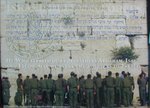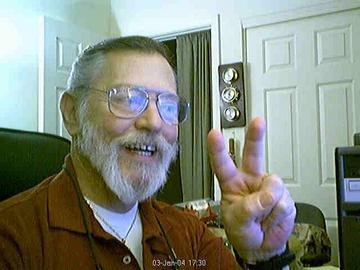David WilderJuly 17, 2008
Yitzhak Herskovitz
The Talmud in the tractate Brachot teaches us that three prizes are obtained via hardship: Torah, the Next World, and Eretz Yisrael. Yitzhak Herskovitz has first-hand experience with the adversity involved in redeeming and settling Eretz Yisrael, the Land of Israel.

R' Yitzchak made aliyah over 20 years ago. A carpenter by trade, he remodeled the lift he used to transport his belongings to Israel into a wonderful home in Kiryat Arba. But a home outside Hebron wasn't enough to quench his thirst for settling our holy land. Back in 1988 he began proceedings to purchase a home in south Jerusalem, near Gilo, today called Givat HaMatos, bordering a neighborhood called by the Arabs, Beit Tsafafa.
The transaction took a few years to finalize but in 1992 he received the papers and the property was his.
Almost. But not quite.
That's because his new home had visitors who had no plans to leave. Arab squatters, the Salach clan had moved in and the new Jewish owner of the property didn't impress them. They stayed.
Yitzchak Herskovitz did what any good citizen would do. He went to the police and eventually to the courts. That's where the case has remained for the past sixteen years.
During the first Magistrate court proceedings, experts proved beyond any doubt that the papers presented by the Arabs, purporting to support their claims, to be forgeries. After years and years of court sessions, the judge ruled in Herskovitz' favor. An order was issued demanding that the police remove the illegal residents from the property. Over the years some seven eviction notices have been issued. But the Salach clan is still there. The police, despite the court order, refused to expel the illegal squatters.
Following Herskovitz' victory the Arabs appealed to a Jerusalem District Court, claiming that they owned the property. The judge decided not only to hear the appeal, but also to retry the case from the very beginning, forcing Herskovitz to keep paying an attorney and bring back all his past witnesses for a second round of court sessions.
Herskovitz' attorney, Ms. Anat Ben-Dror explained that the original court verdict did not rule on ownership of the property, rather regarded the case as an 'eviction hearing.' The Arabs, after losing the first case, then filed an 'ownership suit,' and the judge fell into the trap they set for him and began hearing the case for a second time.
Herskovitz pointed out that when the Arabs made a verbal claim of ownership twelve years ago, the Magistrate Court judge told them in no uncertain terms: 'if you claim ownership, file a claim in the District Court which has authority to rule on such an issue.' The fact that they did not follow the judge's instructions then basically proved that they themselves knew that they had no case.
Not too long ago R' Yitzchak won a small victory in court. The judge ruled that the Arabs would have to deposit all back rent as well as a monetary bond covering future costs, in order for him to cancel the eviction notice issued and still standing against them. However, as of this writing they still have not paid the money, and are still living in the house.
Yitzhak Herskovitz has himself authored a number of documents concerning his property:" I spent 15 years of my life in court. I spent hundreds of thousands of shekels in legal fees, court expenses, investigation and expert research of their documents, which the police crime laboratory and my hand writing expert found to be fabricated. All of this just to pursue justice.
The police do not enforce the law when it comes to Arabs. Should I not be upset when I see and feel the injustice of this?
I understand that there are squatter's rights when they are legitimate. But when they are illegitimate, that person is a trespasser. A trespasser is a criminal. He should be put in jail so the public will know that trespassers go to jail.
I do not believe a person can fathom the pain of what trespassing does to me. The restraint that I bear goes beyond comprehension. I have been told by many not to trust the Israeli courts. I now understand why. It goes without saying: the courts and the government are responsible to protect the property rights of their citizens.
This is the primary function of the government. This is their duty and responsibility. They must provide for the safety and security of their citizens in Hebron, Tel Aviv, Jerusalem or in Beit HaShalom and in Givat Hamatos.
Many of my of my acquaintances and friends keep telling me: Sell it and forget it!
The best answer I can give is that I love my children, I love my family and I love my people. I want them to have a home that they can come home to. We cannot allow Arabs to occupy our homes and our properties, to steal and rob our Land from us.
I want to help guarantee the survival of Israel."
(This article was first printed in the Jewish Press Magazine, Page M8, July 18, 2008 issue)
































 While doing IDF (Israel Defence Forces) reserve duty on a mountain overlooking the
While doing IDF (Israel Defence Forces) reserve duty on a mountain overlooking the 





No comments:
Post a Comment